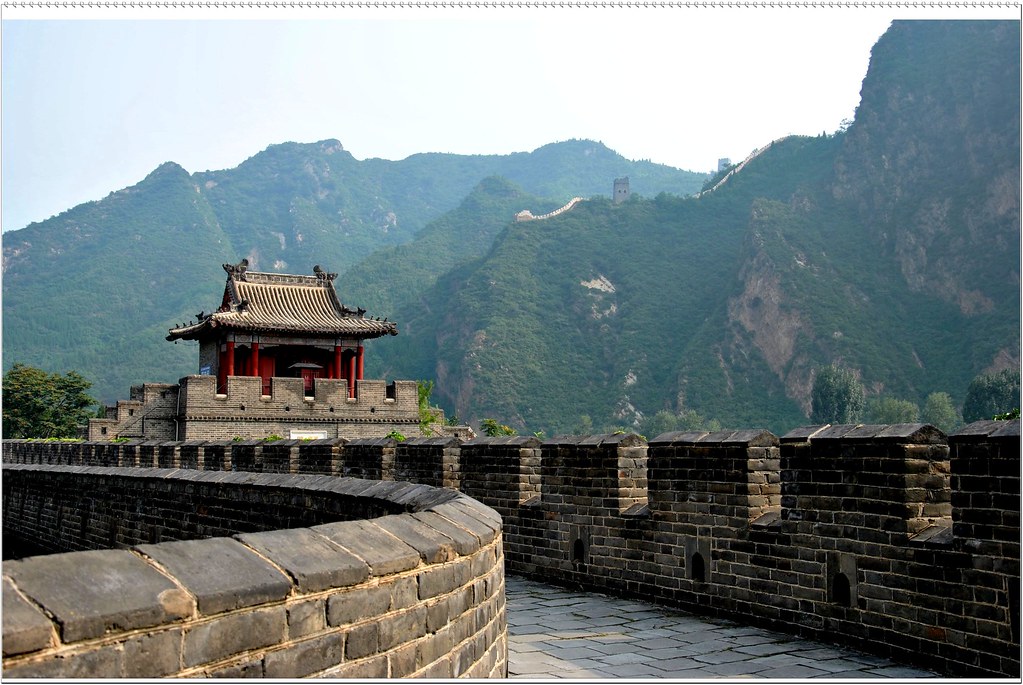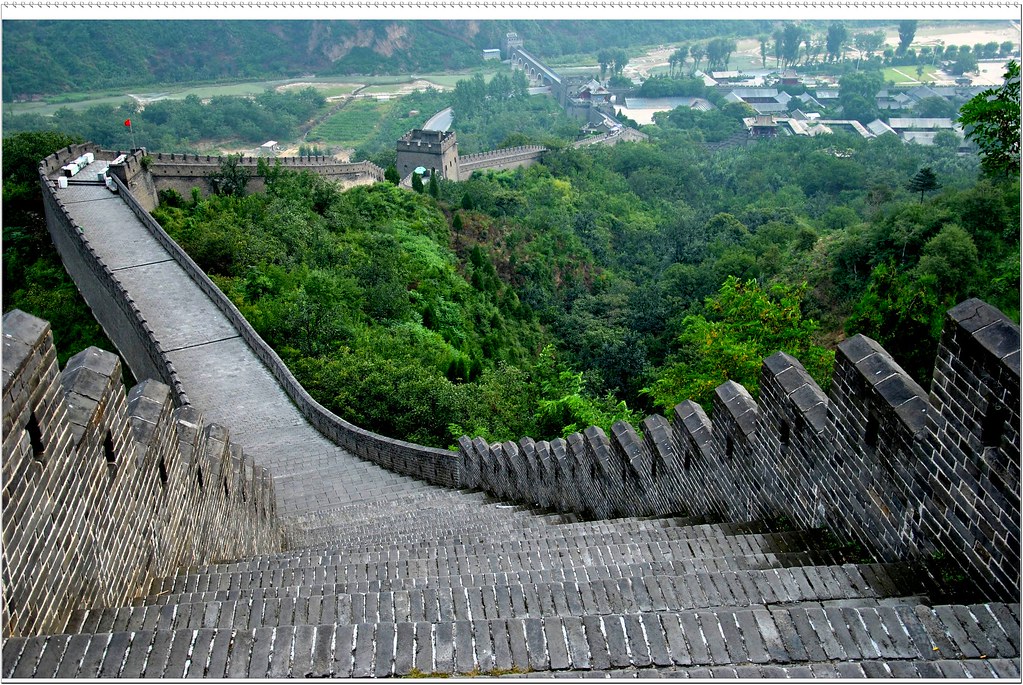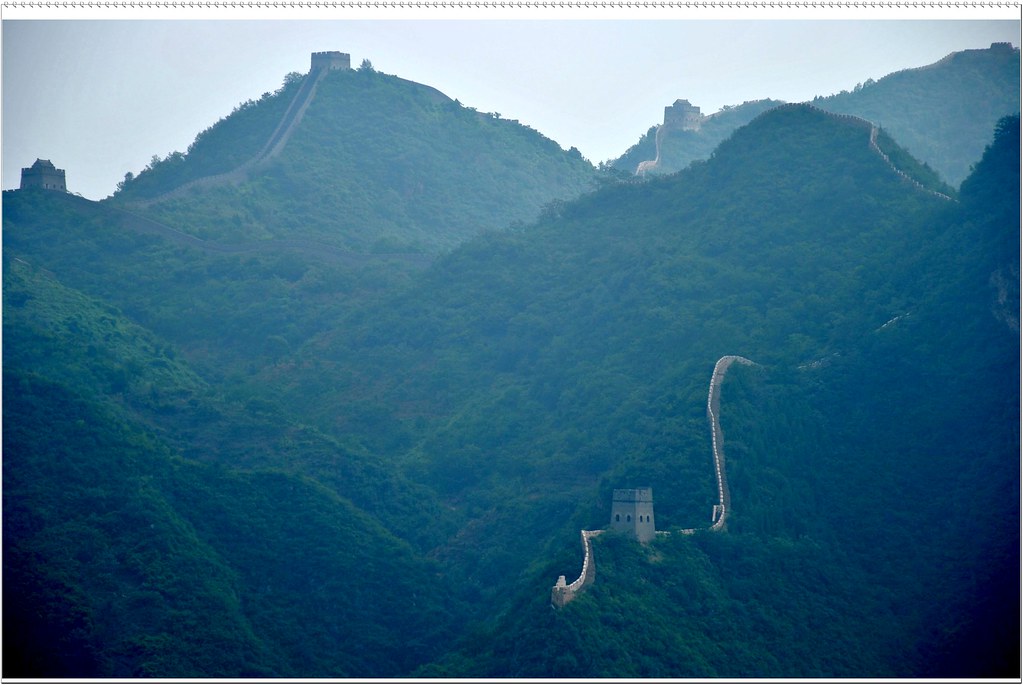- 牡丹和芍藥同宗? [2012/04]
- 從舊金山灣區到大峽谷四日游 [2012/04]
- 「只因為在人群中多看了你一眼」 [2012/06]
- 走近美洲土狼,coyote ugly [2012/02]
- 【現場報道】舊金山華人抗議日本強佔我釣魚島(二) [2012/09]
- 后海夜色 -- Night Life in Beijing [2011/09]
- 體驗城際高速 [2011/09]
- 【太平盛世】步行街 (Shopping Plaza) [2011/09]
- 安享晚年 [2012/07]
- 英譯《我的祖國》 [2011/01]
- 【北嶽恆山】千年懸空寺 [2012/05]
- 【酒足飯飽,信口評說】天津狗不理包子 [2012/05]
- 天津俗文化 [2011/09]
- 蘋果梨 Asian Pear [2011/10]
- 【太平盛世】父老鄉親 [2011/09]
- 香椿菜 [2011/10]
- 家鄉西鳳酒 [2011/11]
- 春天多美好 [2012/05]
- 黃了銀杏紅了楓葉 [2011/12]

(最近回國走了一下長城,圖片另發。想起了多年前的英文作文。咳咳,翻譯還著實費了些功夫。配上幾張照片,就算是文物出土吧。)
圍牆文化深入到我的骨髓里了。大學有一段時間總覺得那校園有些彆扭,究其原因不外乎因為地處鬧市,學校圍牆卻一直沒有完工。那種殘缺實在扎眼。一個連圍牆都不全的地方叫人咋住啊?沒有圍牆周身都不舒服,就像赤身走在鬧市一般沒有遮掩。也真是啊,沒有圍牆都如何顯得我們是精英?怎麼講究的校門和高大的教學樓也因此失去了許多宏偉。去鄉下瞧瞧吧,鄉親們都是先打造圍牆再在裡邊蓋房子的呢。
記得紫禁城的城牆嗎?那一幕一輩子也忘不了,夏天的烈日硬是被皇城堅固的城牆遮蔽得有些暗淡了,可憐兮兮的。外面的世界儼然被城牆和城門隔絕了。圍牆是用來保護人的,對吧?中國文化裡面牆的功能不能純粹用保護來簡化。牆的意義大著哩,哎,可別問我,我也說不太清楚。中國人對圍牆的著迷簡直有些走火入魔,令人費解,其痴迷程度連遠在天邊的卡夫卡的智慧天線也接收到了呢。
"長城建造期間,直至今天,我把全部精力投入到思索世界民族史比較學方面的問題。這樣的思考有助於把有些問題探究到骨子裡,在骨髓里看實質。我發現我們中國的有些風俗和政體有其特有的清晰性,也有其特有的模糊性。我一直期望能夠究根問底,特別是什麼原因導致了那些模糊不清的習俗,因為這裡邊包含著建造長城的原始思維。"(卡夫卡:中國之長城,英譯版,91頁)
卡夫卡先生把自己當成中國的一分子來思考長城。可是卡夫卡先生好像從來沒有在冬天遊覽長城。在八達嶺剛下火車,迎面就有巨大的沉默將我籠罩。朔風嘯叫,幾個慕名而來的遊客只有在狂風肆虐里掙扎的份了,千萬隻鞭子抽打,周身鞭笞。沒有絲毫的舒適可言。
儘管如此,寒冬是我不二的選擇。只有冬天的嚴酷才能給長城如此令人肅然起敬的形象,那令夢境顫抖夜晚飄搖的形象啊。和夢裡一模一樣,一條巨大的龍矗立在人面前,誠然是敗落了,受狂風欺凌,那巨大和悲傷依然令人感動。沉默是徹底的,任何聲音從這龐大的軀體上彈出都變成了微弱的呻吟,幾乎無法察覺。啊,沉默是厚重的,億萬萬赤裸裸的男人站在那裡遙望冬天空落的天空。我是被這些沉靜無畏的眼睛所震撼,感覺我的身體和靈魂被億萬次刺穿。腳踏這些催人淚下的肩膀和後背需要多大勇氣和決心啊。火辣辣的感覺哦,我總不會眼巴巴地看到我的腳在朔風裡被冷火融化吧?
這裡的每塊磚都有一個故事,所有的故事加起來才有了長城這憾人的力量。我長時間地看著那些悲哀依舊尊嚴依舊的眼睛;我不知道它們在看什麼,天空,海洋,或者直接就是這個宇宙的混沌?在這裡我感受了許多世紀在沉默里悄然而過,我接受這樣的命運:我必須在沉默里忍耐幾多世紀。我沒有別的選擇,因為他們逼視著我。每個眼睛是鋼針般尖銳。我承受不了如此的責備。沉默在擴張,我不敢出聲,不敢挪動。塑像一般站立,我知道我也要學會沉默。這就是命運。如果這些人可以在沉默里度過諸多世紀,難道我就不能沉默一天,或者短短的一生?
我還不至於愚鈍到忘記父輩和祖輩們磨損了的肩膀和佝僂了的腰。一雙雙眼睛穿越高山,森林和海洋看著我,也穿透了我的心。不論我走到哪裡,這些目光總是看著我。有一天我會長大,長成一個中國男子漢,也要能夠像長城的一塊青磚頂天立地。這就是命運。
荒涼是永恆的主題,遊客稀少,群山巍峨,沒有一絲兒綠意。那城牆古老,土氣,子孫輩又讓那城牆恢復了原形,凜然佇立,面對大風。上到山頂,可以看到那城牆延伸到黑暗處的地平線了。其實,長城就是人造戰壕,地面工事,而不是地下掩體。如今這工事破敗了。一片灰濛濛的天地依然能感覺當年的熱血噴涌。幾千年了,血液可能冷卻了,戰場可以泛綠,但是血流從來沒有停止流淌,滲透。這大山曾經遭受炮轟,火烤,只是長城不曾倒下。是啊,沒有了生息,只有裸露的青磚無畏的兀立。寒冷不能,大風不能,無情的歲月也不能讓站立的勇士發抖。是啊,死了,死了千年了。只是,死亡在這裡依然轟轟烈烈。
令人生畏的寒冷也沒有能夠阻止我匍匐在地,噢,冰冷的磚頭散發著屍體的味道。心裡明白每塊方磚都有一雙尖銳的眼睛,但是我不再畏縮,年幼的我已經經歷了太多的死亡了。這裡的每塊磚頭就是一個生命,這不再是什麼秘密。幾百萬男人死在這裡,埋在了這裡。
上到高處,開始感覺頭痛欲裂。那裡能夠看到北方,沒有保護的大地啊。回頭也能看到南邊,曾經受「保護」的地方。可是我愣是沒有看到差別,都是一般的土色,都在凄厲的寒風裡哆嗦。保護這個詞開始困惑我,這到底是保護什麼,保護誰呀?保衛黃河?保護黃土地?還是保護紫禁城?我咋從來沒有想到過,這牆也是用來保護那些建牆的人們的呀!普通平民的生民貧賤哪,這個才是我的親身經歷。
保護也罷,不保護也好,黃河依然泥沙俱下。接受保護,人們的眼淚也得流入特定的支流。幾千年了,我們被統治到了細細節節。誰能告訴我這保護的意義,如果我們在牆內互相殘殺?慢慢我讀懂了舒婷:我無法反抗牆,只有反抗的願望。

The culture of wall rooted deeply inside me. When I went to university, I did not get along with the campus for quite some time. It was located right in the middle of the downtown and yet the campus wall was not quite complete. It didn't look right. How could we live in a wall-less place? It felt funny without wall, as if we were naked in the middle of a busy street. Indeed, what was the use to build a gorgeous gate and mammoth buildings inside if there was not a wall to outline our prestigious presence? Even back in the villages, folks build wall first before they build house inside, for crying out loud.
Does any body remember the walls of the Forbidden City? I can never forget the sight that the mighty summer sun dimmed quite a bit the inside of those well-constructed Forbidden City walls. The outside world was, indeed, being forbidden by the walls and gates. But walls are supposed to protect us, right? And yet protection is too simplistic a function for walls in Chinese culture. There is more to the wall than that. Hey, don't ask me why. The Chinese obsession with wall has grown almost out of proportion and has become intellectually complicated, so much so that the intellectual antenna of Franz Kafka has caught it from afar.
Does any body remember the walls of the Forbidden City? I can never forget the sight that the mighty summer sun dimmed quite a bit the inside of those well-constructed Forbidden City walls. The outside world was, indeed, being forbidden by the walls and gates. But walls are supposed to protect us, right? And yet protection is too simplistic a function for walls in Chinese culture. There is more to the wall than that. Hey, don't ask me why. The Chinese obsession with wall has grown almost out of proportion and has become intellectually complicated, so much so that the intellectual antenna of Franz Kafka has caught it from afar.
"During the building of the wall and ever since to this very day I have occupied myself almost exclusively with the comparative history of races--there are certain questions which one can probe to the marrow, as it were, only by this method--and I have discovered that we Chinese possess certain folk and political institutions that are unique in their clarity, others again unique in their obscurity. The desire to trace the cause of these phenomena, especially the latter, has always intrigued me and intrigues me still, and the building of the wall is itself essentially involved with these problems." (Franz, Kafka, The Great Wall of China. Translated by Willa and Edwin Muir. New York: Schocken Books, 1970. p.91).
Mr. Kafka took himself as a member of the Chinese race but I bet he never visited the Great Wall during winter time. Immediately I felt a tremendous silence coming onto me as I descended the train at the foot of Bada Mountain. The winter wind was howling and choking us a few courageous tourists with its bitter and unruly temperament. It was like a thousand whips showering our bodies from head to toe. Life was not allowed to be comfortable there.
Still winter was my choice. My heart told me that only winter with its harshness could give the Great Wall its due dignified and respectable looks that haunted my dreams, and haunt my nights still. As expected, when I saw a gigantic dragon standing before me though looking defeated and still being attacked by the relentless wind from all directions, I was deeply affected by the sheer size and the grief it held to itself. It was ultimate silence, any sound bouncing off that tremendous body turned into a low-pitch moan, hardly audible. It was a powerful silence because it was the silence of thousands or millions of naked men standing and staring into the empty winter sky. I was shaken by these calm and fearless eyes, as if my body and soul were pierced through thousands or millions of times. In fact, it took a great deal of courage to step on those miserable shoulders and backs. They might be too hot and my feet might melt right in front of my eyes in the harsh winter wind.
Power accumulated with each every story buried in the bricks of the wall. Looking at those sorrowful but dignified eyes, though I did not know what they were looking at, The earth? The sky? The ocean? Or simply our universe of great chaos? I seemed to understand how many centuries had passed in utter silence, and started to accept the fact that there would be many centuries of silence ahead for me to endure on. I had no choice, for they were all staring at me. Every eye was like a sharp needle made of steel. I could not stand up to so much blame. The silence only grew, for I dared not to make any noise, nor move a step. Frozen like a statue, I felt that I should embrace the silence. That was my fate. That was our fate. If they could be silent for many centuries, why couldn't I be silent for a day, or a pitiful short life?
Yet I did not want to appear stupid. I could not help telling the story about the torn shoulders and crooked backs of my parents and grandparents. When their eyes cut through mountains, forests and the ocean, they also pierced through my heart. No matter how far I'm away from home, those eyes find me and follow me everywhere. I would be a man some day, a Chinese man. I must stand up to anything just like a gray brick on the wall. This is my fate.
Barrenness was the main theme forever, visitors scarce, not a trace of green in sight on an enormous stretch of mountainous land. The Wall, earthy and ancient, restored by the contemporary children to its former glory, stood up dangerously on the mountains, facing up to the gusty wind. Once on top of a hill, I could see the wall snake into the dark horizon. By essence the Wall was nothing but a man-made battle trench up ground, as opposed to underground. It was a trench broken. Still under the vast grayness one could see or sense boiling blood once raging here. Gradually, hot blood cooled down and may have become green during the the course of millennia but still hasn't stop running and spreading. The mountains was pounced upon by cannon balls and burned by raging fires. But the Wall had not disappeared. Lifeless, yes, but the naked bricks were forever fearless. Nothing, the cold, the wind, the brutality of time, could really defeat that mighty stance. Dead, yes. Has been so for centuries. But even death has become spectacular there.
The cold was murderous but it did not stop me from throwing myself to the Wall, on all fours, those damp bricks smelt like, well, dead bodies. I knew that each of the over-sized bricks had a pair of penetrating eyes but I was not frightened any more, for I had seen enough deaths in my young life already. It was not a secret that every brick on the wall counts for the life of a man. Millions of Chinese men had died for and been buried in the Wall.
At one of the high points an unbearable heartache assaulted me. From there I could see the north, once outside of the protected world, and also look back to see the south, the once "protected" world. I could not tell the difference. They were all earthy gray and trembling in the howling wind. I was puzzled by the word "protected." What or whom was supposed to be protected here? The Yellow River? Or the Yellow Earth? Or the Forbidden City? And it never crossed my mind that the Wall was built to protect those who built it. The life of the ordinary meant nothing but misery, I knew that from first hand experience.
Protected or not, the Yellow River would flow with mud. But protected, our tears had to drop into the proper branches as we had been ruled in every detail of our behavior for thousands of years. And, what's the meaning of protection, tell me, if we kill each other inside the wall? Slowly I start to understand why Shu Ting writes: I have no way to fight the wall except my desire to fight it.
Mr. Kafka took himself as a member of the Chinese race but I bet he never visited the Great Wall during winter time. Immediately I felt a tremendous silence coming onto me as I descended the train at the foot of Bada Mountain. The winter wind was howling and choking us a few courageous tourists with its bitter and unruly temperament. It was like a thousand whips showering our bodies from head to toe. Life was not allowed to be comfortable there.
Still winter was my choice. My heart told me that only winter with its harshness could give the Great Wall its due dignified and respectable looks that haunted my dreams, and haunt my nights still. As expected, when I saw a gigantic dragon standing before me though looking defeated and still being attacked by the relentless wind from all directions, I was deeply affected by the sheer size and the grief it held to itself. It was ultimate silence, any sound bouncing off that tremendous body turned into a low-pitch moan, hardly audible. It was a powerful silence because it was the silence of thousands or millions of naked men standing and staring into the empty winter sky. I was shaken by these calm and fearless eyes, as if my body and soul were pierced through thousands or millions of times. In fact, it took a great deal of courage to step on those miserable shoulders and backs. They might be too hot and my feet might melt right in front of my eyes in the harsh winter wind.
Power accumulated with each every story buried in the bricks of the wall. Looking at those sorrowful but dignified eyes, though I did not know what they were looking at, The earth? The sky? The ocean? Or simply our universe of great chaos? I seemed to understand how many centuries had passed in utter silence, and started to accept the fact that there would be many centuries of silence ahead for me to endure on. I had no choice, for they were all staring at me. Every eye was like a sharp needle made of steel. I could not stand up to so much blame. The silence only grew, for I dared not to make any noise, nor move a step. Frozen like a statue, I felt that I should embrace the silence. That was my fate. That was our fate. If they could be silent for many centuries, why couldn't I be silent for a day, or a pitiful short life?
Yet I did not want to appear stupid. I could not help telling the story about the torn shoulders and crooked backs of my parents and grandparents. When their eyes cut through mountains, forests and the ocean, they also pierced through my heart. No matter how far I'm away from home, those eyes find me and follow me everywhere. I would be a man some day, a Chinese man. I must stand up to anything just like a gray brick on the wall. This is my fate.
Barrenness was the main theme forever, visitors scarce, not a trace of green in sight on an enormous stretch of mountainous land. The Wall, earthy and ancient, restored by the contemporary children to its former glory, stood up dangerously on the mountains, facing up to the gusty wind. Once on top of a hill, I could see the wall snake into the dark horizon. By essence the Wall was nothing but a man-made battle trench up ground, as opposed to underground. It was a trench broken. Still under the vast grayness one could see or sense boiling blood once raging here. Gradually, hot blood cooled down and may have become green during the the course of millennia but still hasn't stop running and spreading. The mountains was pounced upon by cannon balls and burned by raging fires. But the Wall had not disappeared. Lifeless, yes, but the naked bricks were forever fearless. Nothing, the cold, the wind, the brutality of time, could really defeat that mighty stance. Dead, yes. Has been so for centuries. But even death has become spectacular there.
The cold was murderous but it did not stop me from throwing myself to the Wall, on all fours, those damp bricks smelt like, well, dead bodies. I knew that each of the over-sized bricks had a pair of penetrating eyes but I was not frightened any more, for I had seen enough deaths in my young life already. It was not a secret that every brick on the wall counts for the life of a man. Millions of Chinese men had died for and been buried in the Wall.
At one of the high points an unbearable heartache assaulted me. From there I could see the north, once outside of the protected world, and also look back to see the south, the once "protected" world. I could not tell the difference. They were all earthy gray and trembling in the howling wind. I was puzzled by the word "protected." What or whom was supposed to be protected here? The Yellow River? Or the Yellow Earth? Or the Forbidden City? And it never crossed my mind that the Wall was built to protect those who built it. The life of the ordinary meant nothing but misery, I knew that from first hand experience.
Protected or not, the Yellow River would flow with mud. But protected, our tears had to drop into the proper branches as we had been ruled in every detail of our behavior for thousands of years. And, what's the meaning of protection, tell me, if we kill each other inside the wall? Slowly I start to understand why Shu Ting writes: I have no way to fight the wall except my desire to fight it.

- [09/11]【太平盛世】步行街 (Shopping Plaza)
- [09/14]夏威夷舞
- [09/21]老人和孩子
- [09/25]【走訪校園】加州大學聖芭芭拉分校 (UC Santa Barbara)
- [09/28]后海夜色 -- Night Life in Beijing
- [09/30] 圍牆文化 -- Wall in Chinese Culture
- [10/01]【朗誦視頻】父親的草原母親的河
- [10/03]【薊北雄關】黃崖關長城
- [10/06]金州之秋 -- Autumn in the Golden State
- [10/10]精品二鍋頭
- [10/12]灼傷的美麗
- [10/13]蘋果梨 Asian Pear
- [10/15]千年古剎獨樂寺
- 查看:[RidgeWalker的.最新博文]
- 查看:[大家的.最新博文]
- 查看:[大家的.原創文學]
發表評論 評論 (62 個評論)

- 回復 Emansfield
- 重新認識。。

好美的照片。。。

- 回復 RidgeWalker
- 出土文物,古為今用。
小小..: 寫論文




- 回復 RidgeWalker
- 很多照片,還會再表。
Emansfield: 重新認識。。

好美的照片。。。

- 回復 RidgeWalker
- 練習英文,黑燈瞎火,沒看見賽場。哈哈
瑋哥: 是作文比賽吧


- 回復 RidgeWalker
- 被感染,不敢出聲。
yuki-1217: 接受沉默~~

- 回復 RidgeWalker
- 柏林牆也是一大創舉。如今美國在墨西哥邊境也建長城。
銅山: 德國也有城牆啊!柏林牆~ 只不過產生的背景、年代、目的不同,算不上文化~
好文,"黑燈瞎火", 點著蠟燭也要看啊!圖片很美~~ 妄想索取呢!
萬里長城永不倒。。。

- 回復 RidgeWalker
- 家,國,天下;人的智慧里必然參雜愚蠢。
銅山: 哈哈!圍牆文化是無國界的,而它本身又是國界~~

- 回復 RidgeWalker
- 周全了,萬無一失了就出現漏洞了。
銅山: 事物的矛盾性~~


- 回復 RidgeWalker
- 可是多少活鮮鮮的生命,或者白花花的銀子沒有了。
銅山: 漏洞補上了,又周全了~~

- 回復 yingyanghuo
- 「長牆」在中國就是長城。。。。

- 回復 fanlaifuqu
- 與錢鍾書的圍城好有一比!
RidgeWalker最受歡迎的博文
其它[原創文學]博文更多
- 翰山:童年的讀書經歷 (上:熏陶篇)
- 我是虔謙:短篇小說:雨夜奇遇(下)
- kzhoulife:恨不相逢未嫁時 (續)
- 石竹苑:深南夜未央(20)宿舍問題
- 海攀:混在美國名校(184)---浪漫與激情之崇拜女神
- 我是虔謙:短篇小說:雨夜奇遇(上)
- 平凡往事:中年性福(少兒不宜)
- 黃笑吾:人世間:男人的秘密(下)
- 海攀:混在美國名校(183)---浪漫與激情之因愛離去
- smusin:法國小學教家長怎麼對孩子說話
- Waterlily888:愛和性(原創小小說)
- 海攀:混在美國名校(182)---浪漫與激情之攻讀MBA
- 水影兒:一位男人的情感自白(少兒不宜)
- kzhoulife:恨不相逢未嫁時 (小說,純屬虛構)
- 海攀:混在美國名校(181)---浪漫與激情之新的開始
- 黃笑吾:人世間:男人的秘密(上)
- leahzhang:移民之痛--8--律師的私情
- 我是虔謙:短篇小說 跨狗婚姻 (完)
- 平凡往事:實驗室里的艷事(四) 出軌









